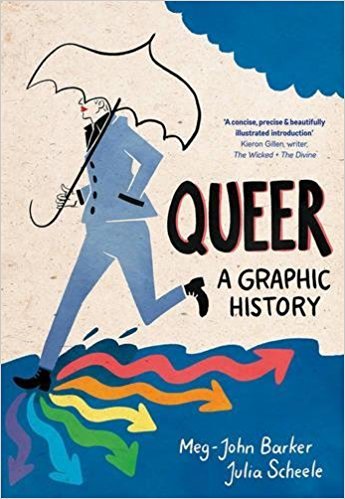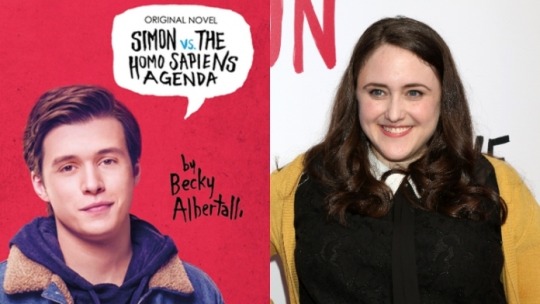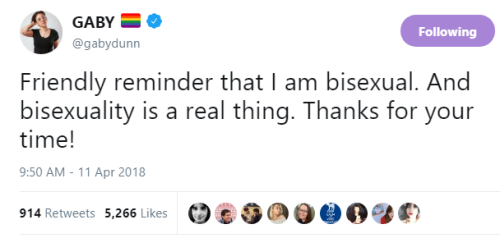#bisexual authors

So fun fact, this is not a book about the word queer or queer community. It’s a graphic novel explanation of academic Queer Theory.
Which I didn’t know when I picked it up, so I wanted to make that super clear. I just think the cover is a bit misleading. It had me thinking this was more of a generalist work when really its highly academic. That doesn’t mean you shouldn’t read it though! Its a good introduction to Queer Theory. I just didn’t know beforehand.
I think Queer Theory works about as well as a graphic novel as it works as anything else. Queer Theory is DENSE and difficult to understand (at least for me) and the graphic format allowed for some visual representation of complex ideas. But there were also a lot of talking heads. Quite literally. Most queer theorists are shown with their most famous words in word bubbles above their heads.
In my opinion, some of the best parts are when we see real queer people either illustrating or repudiating some of this theory, particularly the parts where cis gay men love to speak for all of us in deliberately confusing language (*coughcoughLeeEdelmancough*). Barker and Scheele don’t let them skate on this, providing differing viewpoints and outright critiques. I liked that.
I also loved the way bisexuals are wholly and completely integrated into this book in a way I’ve never seen from a Queer Theory text. Even when the examples are not strictly about bisexuality, we are still included. There is a example that has nothing to do with bisexuality persay, but showed a researcher talking to bi communities, reading bi books, going to bi conferences, and HELPING BI PEOPLE. Seriously this panel almost made me cry. We never get this kind of consideration. Usually the best I hope for in general queer/LGBTQ nonfiction is to not have any blatant biphobia. I never hope for holistic inclusion. Meg-John Barker is bisexual and perhaps that is why this book lacks the usual unchallenged monosexism.
So if you’re looking for an introduction to Queer Theory that is bi-friendly, visually inclined, and about as accessible as this subject is ever going to get, I say pick this one up.
- Sarah
Hey guys. Wow. Its been like two years since anybody posted here and three since I wrote anything of substance? In my defense I adopted a teen so life got super duper busy around that time, but now that I’ve (mostly) sorted out the day to day parenting stuff, I’m back. At least for today. Because whooo boy do I have A LOT thoughts and feelings about the situation with Becky Albertali.

So let’s jump right in : I don’t feel bad for Becky Albertali . Not at all. I think she is wrong and am not moved by her medium post. I think Gabby Dunn is on the right track to criticize her and I would like do so as well because I think she is wrong.
What Albertali (and her twitter fans) seem to willfully ignore in her medium piece is that readers don’t side-eye straight authors without good reason. We do it because over and over and over again, straight authors do a shit job of writing about queer issues, creating realistic queer characters, and discussing queer issues. How does an author earn the ability to avoid that side-eye? How do they avoid questions, comments, and concerns about their ability to do those things in their writing? By being an open and proud member of the queer community ie coming out. Coming out is important and difficult work in a fundamentally heterosexist society, and hence is rewarded as such by our community. If you don’t do that work, why exactly should I or any other queer person give you that cachet?
Fundamentally I see Becky Albertali wanting the socio-emotional bennies of queer author status, without doing the work of coming out. And I’m just not finding much sympathy for that. She is not owed the benefit of the doubt by readers, particularly queer readers. She has to earn it. Yes, it probably was difficult for her to be questioned about her orientation while questioning, but those questions are reasonable and legitimate.
Queer readers don’t just sit around like a dragon hording legitimacy and saying ‘mwhahaha’ to poor little straight authors. We do this as a self-protection mechanism with good reason. We’ve experienced characters that are just a grab bag of stereotypes. We’ve been gutted when straight authors we trusted as allies say horribly offensive things. We’ve read arguments about queer people that bear no resemblance to our real lives and we’ve literally cried ourselves to sleep over disappointing, nasty, rude, offensive, and heartbreaking books (at least I have).
If Becky Albertali and her defenders want to make life easier on queer authors, then instead of blaming queer readers for asking those questions, they need to interrogate why those questions need to be asked and how to reduce that need.
Instead I see Albertali in her medium piece blaming queer readers for needing to protect themselves, for needing to side-eye, for needing the explicit power of #ownvoices and support of out authors. I don’t see her piece putting rightful, blame on straight people and straight culture that created these situations in the first place. Blaming queer readers for daring to question her is a pernicious type of victim blaming, and I have no time or patience for that. We erect these walls to protect our own hearts and souls, not because we’re big meanies. If you don’t want to be on the wrong side of the wall, then help dismantle the need for it. Don’t blame us for its existence.
I’ve seen some people on twitter say this is somehow gatekeeping or cutting people off from exploring/discovering their queerness in art. And I think that argument is off base. No one was preventing Alberteli from making her art. She could have written in a notebook or on Smashwords for all the days of her life. People can make a dozen deviantart accounts or twitter accounts or AO3 accounts or tumblr accounts or discord servers and post their queer art creations all over the internet while they work out their queer feelings. It is easy and free and no one is stopping anyone else from doing so.
However I think when you cross the line from creating your queer art to profiting off your queer art, something fundamentally changes. The stakes go up. Queer readers need to know so they can decide who to trust with their hard earned cash. We live in capitalism, man. If you think that sucks, help dismantle that too.
Albertali looked back in her piece, so I also want to cast back to early 2015, when Albertali first published Simon vs the Homo Sapiens Agenda. Bi YA author Corrine Duyvis woudn’t coin the term/hastag #ownvoices until September of that year. And it was A LOT easier to get a YA book with LGBTQ characters published if you were straight. How do I know that? Because it was like pulling teeth to find queer authors writing queer characters outside of small queer presses. I was hardcore book blogging at that time. The mainstream publishing industry side-eyed YA/kidlit queer authors, especially those who were less polished due to poverty/educational attainment/systemic racism/disability, to favor straight white authors with post-graduate degrees along with a handful of token queer authors that were already a part of the publishing industry. This was slowly changing but it hadn’t changed that much. It was still easier to get a queer YA published as a straight person.
And Albertali knowingly entered into and profited off that system.
She literally has cash in the bank off the publication of the book Simon vs the Homo Sapiens Agenda, the subsequent film that became Love Simon, the subsequent book reprints and merchandise under the name Love Simon and the subsequent Love Victor show on Hulu. They sold Love Simon shirts at Hot Topic for $20 for crying out loud. She was able to obtain that money, prominence, and influence because she presented herself as a straight woman.
There is no comparable story in queer authorland because queer authors are simply not given the opportunity to turn their queer novels into multimedia cash cow franchises. The closest thing I can think of is Armistand Maupin’s ‘Tales of the City‘ and that took 20 years to be made into a tv miniseries with subsequent books. That was 27 years ago and to my knowledge, no one sold shirts. So for most of my/ Albertali’s lifetime, there has been no viable path to create a queer media empire as a queer author. None.
Until Albertali did it while pretending to be a straight girl.
She says that she legitimately did not know she was queer when Simon vs the Homo Sapiens Agenda was published or when Leah on the Offbeat was written. It does suck that she had to figure that out while living such a public life and I feel bad that it was hard. But honestly it sucks for everyone to figure that out. It sucks to figure that out as an isolated teen or a professional adult. Its just an emotionally grueling process. Wanna make it better for future people? Again work to disable heterosexism and heterocentrism in wider society. Blaming queer people for that heterosexism and heterocentrism, and chiding them for not giving you unearned benefits of the doubt doesn’t do anything to disable those systems. No one forced you to sign a movie deal or do a ton of interviews, you did that all on your own. Ignorance of the consequences of your own actions doesn’t exempt you from having to deal with them.
Only very very recently has the publishing landscape shifted so #ownvoices is a selling point instead of a liability. Only very very recently (and I would argue very minimally) has the publishing industry valued #ownvoices authors enough to nurture and polish their skills with open submissions and contests for people who don’t have grad degree levels of writing skills. And Albertali is upset at being excluded from this? When she literally has the educational privileges of a doctorate and significantly more money than the average queer author has made in my lifetime?
The closet sucks but no one forced Albertali to stay in it and queer people didn’t create it. She chose to publish and license her work to reap the benefits, and as such also reaps the consequences. Apparently one such consequence was that it was personally difficult for her to understand her sexuality and her mental health was poor. Well…. until we can disassemble heteropatriarchy that is the world we live in. Get your queer house in order before you go pro and open yourself up to real reactions from queer readers. But if like Albertali, you don’t do that while choosing more and more publicity and raking in wheelbarrows full of cash, well, don’t expect much sympathy from me.
- Sarah
Brand new today: a fluffy lesbian/bi girl contemporary romance starring two Jewish cuties in South Florida!
Small-batch independent yarn dyer Clara Ziegler is eager to brainstorm new color combinations–if only she could come up with ideas she likes as much as last time! When she sees Danielle Solomon’s paintings of Florida wildlife by chance at a neighborhood gallery, she finds her source of inspiration. Outspoken, passionate, and complicated, Danielle herself soon proves even more captivating than her artwork…
Knit One, Girl Two is $1.99/68 pages. Cover art by Jane Dominguez; picture of Clara and Danielle is by @agaricals on commission.
I’m reading this right now and I love it!
Listen, I’m reading this and i’m like 5 pages in (on my kindle app) and ran into this sentence:
“I am so gay,” she whispered to herself happily.
YES. YES EXACTLY THIS. THIS IS ME EVERY FUCKIN DAY I ALREADY IDENTIFIED HARD WITH THIS GIRL OVER MUSICAL THEATER AND YARN BUT NOW I KNOW I WILL FOLLOW HER TO THE ENDS OF THE EARTH.
…basically get this cute little novella, it’s precious adorable girl-loving fluff.
I just finished and oh my gosh, I am smiling so much! This story was perfect and so, so sweet! There are queer and trans characters throughout the book apart from the lesbian lead and her bisexual love interest, and even though they only have a couple of lines each (the book is only 68 pages) they have their own individual personalities, and they felt real to me rather than tokens. There are trans characters of all ages, which made me so happy.
The book also shows a lot of the MC’s relationship with her sister, destroying the myth that having a f/f romance, especially one at the center of a story, somehow undervalues platonic relationships between women.
Also, the characters interact with each other in a way that represents how I interact with my friends. family, and partner as a queer person (and a queer nerd at that) I’ve never seen in fiction. There’s this myth we don’t talk about being queer with each other, or think about it all that much. Even when we’re represented in fiction, we rarely talk to each other at all (there should be some kind of queer Bechdel-Wallace test). When we’re allowed to exist in media, we’re expected to do so quietly. (Seeing fanfiction represented as something that resonates with queer people rather than the myth that it’s just for ‘straight teenage fangirls’ meant so much to me, too!)
And, (vague spoiler ahead!) seeing a character’s struggle after trauma to create something using her chosen medium resonated so much with me as a writer who has struggled to write outside of fanfiction (and even then not feeling ‘into it’ like I used to) for years.
This story is seriously amazing and I have actually deleted several paragraphs of me gushing over it because I could go on and on! As a note, I usually don’t like contemporary stories, but I REALLY loved this one. 6/5 stars. :)
It’s out in pdf now as well for those of you who don’t do Kindle format!
https://gumroad.com/l/XJAMO^Get this short story, ya’ll! It’s now in PDF as well as on Kindle! :D
Post link



